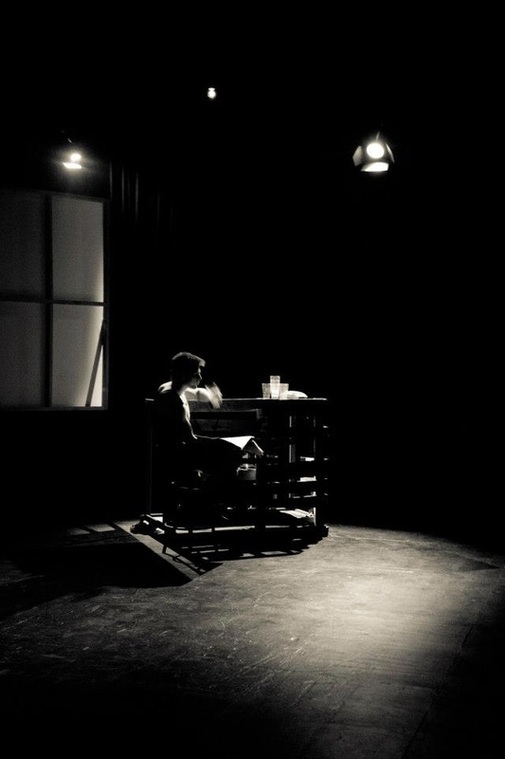|
Just over six weeks ago, I was invited to direct a new play. For me this was a big ask, as I have only directed two plays before, both works I had chosen and had several months to work on the concept before rehearsal. But it was a good play and a massive challenge, so I accepted.
And challenge me it has, bringing up the question of how you can get the very best out of your actors, without turning you into a screaming sergeant major barking orders from the sidelines. A megaphone, anyone? One thing I have learned about myself is that I am a perfectionist with a good dose of control freak, a less than admirable quality that I try to control, wryly ironic I know. But I have also been reminded of how much I have learnt, thanks to some truly amazing teachers. First and foremost, the incredible Jean-Pierre Voos, whose genius and skill was ocassionally overshadowed by his rage when his actors didn't get it, or he felt they were being lazy, stupid or unwilling to try something new no matter how out of left field. (Sometimes I hear myself using his exact words; one of my favorites is: "Why don't you try it and then we will both know".) All he demanded from his actors was absolute 24/7 dedication to the work. I worked with him for over nine years and I'm still only realising how incredibly fortunate I was. From Jean-Pierre I learnt how disciplined you must be to honor the work, I learnt stage craft and he instilled in me a love and respect for the text and a real sense for working with the unique rhythms of each piece - cherishing words. But most of all, he instilled in me the importance of communicating to the audience. For me, an actor's job is to make the audience feel. I remember after a particularly "emotional" rehearsal Jean-Pierre letting us know that clearly we were having a "great" time, but the audience were feeling nothing. From the wonderful Catherine HIll, who I was lucky to work with on three productions, I again learnt a true respect of the text, she insisted everything must come from the words. An actor, aided by the director, is like an archaeologist uncovering the meaning, layer by layer. And finally Ailsa Piper, who I was lucky enough to take classes with recently (and I am known to call on her skills and compassion when a terrifying audition approaches). From Ailsa, I was reminded of how surprising the truth is, how unexpected, how much work an actor needs to do so they can let it all go when they walk on the stage and, again, a respect for the words, the rhythms of language and the primal effect the very sound we make has on the human psyche when expressing our truth. So, trying to fill these very big shoes, I walk into rehearsal. Now, with less than a week to go before we open, this tough, challenging, fascinating, button pushing, wonderful experience has made me clarify my own passion for the theatre. So here it is: I believe that, even though creating an authentic and emotionally truthful life on stage is an important part of much of the work (sometimes we need to create a heightened theatrical world, but create it so vividly that, for the time we inhabit it, we and the audience believe it to be the truth), it is only one of the many steps we need to take to creating a piece of theatre that will resonate. It's not the actor's job to feel, making the audience spectators to their emotions. It is the actor's job to get the audience to emotionally, intellectually and, sometimes, when the god of theatre is with you, spiritually engage with the story. Jean-Pierre was right, an actor's job is not to feel but to get the audience to feel. But an actor doesn't have to do it alone, they have the text. The springboard to action, and plays are all about action. Exploring the words, uncovering their meanings and grounding that meaning in intentions that makes not just the meaning, but the feeling clear to the audience. And an actor needs to do it with with an impressive amount of skill. They need to be masters at communicating the smallest nuance to the audience, to let them in. This takes a dedication to physical and vocal work a dedication to practice and a self awareness to rid yourself of bad habits. We all have habits that creep into the work, part of an actor's job is be able to watch themselves, watch the way they walk stand, breathe, remember how it feels to be in every kind of situation, to become a keen and critical observer of themselves. Every flick of an eye, glance to the ground, fidget or shuffle must be there only to reveal something about the story to the audience, or it is a distraction and the audience will disconnect, making it twice as hard to win them back. This is not a permanent state that it is possible to achieve and remain in, but something for an actor to aspire to and to rejoice in those ever so brief moments when it all comes together. It's also a massive challenge, and as I inferred at the beginning of this ramble, I can't resist a challenge. So what has directing brought me? A realisation of my own bad habits and current shortcomings as an actor, and a burning desire to free myself from them so I can amplify the connection I make with the audience. So, thank you to all the wonderful, dedicated performers I am working with for giving me my next irresistible challenge.
7 Comments
|
Author"Pocket Sized Archives
December 2023
|

 RSS Feed
RSS Feed